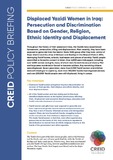| dc.contributor.author | Shammo, Turkiya | |
| dc.contributor.author | Saleh, Diana Amin | |
| dc.contributor.author | Khalaf, Nassima | |
| dc.coverage.spatial | Iraq | en |
| dc.date.accessioned | 2022-12-16T09:41:32Z | |
| dc.date.available | 2022-12-16T09:41:32Z | |
| dc.date.issued | 2022-12 | |
| dc.identifier.citation | Shammo, T.; Saleh, D.A. and Khalaf, N. (2022) Displaced Yazidi Women in Iraq: Persecution and Discrimination Based on Gender, Religion, Ethnic Identity and Displacement, Policy Briefing 12, Coalition for Religious Equality and Inclusive Development, Brighton: Institute of Development Studies, DOI: 10.19088/CREID.2022.010 | en |
| dc.identifier.uri | https://opendocs.ids.ac.uk/opendocs/handle/20.500.12413/17808 | |
| dc.description.abstract | This CREID Policy Briefing provides recommendations to address the marginalisation, discrimination and exclusion faced by displaced Yazidi women in Iraq. Throughout the history of their presence in Iraq, the Yazidis have experienced harassment, persecution, killing and displacement. Most recently, they have been exposed to genocide from the Islamic State (ISIS) group after they took control of Sinjar district and the cities of Bahzani and Bashiqa in the Nineveh Plain in 2014, destroying Yazidi homes, schools, businesses and places of worship. Yazidi people were killed or forced to convert to Islam. Over 6,000 were kidnapped, including over 3,500 women and girls, many of whom were forced into sexual slavery. Men and boys were murdered or forced to become soldiers. Any remaining citizens were displaced. Seven years later, more than 2,000 Yazidi women and children were still missing or in captivity, more than 100,000 Yazidis had migrated abroad, and over 200,000 Yazidi people were still displaced, living in camps. | en |
| dc.language.iso | en | en |
| dc.publisher | Institute of Development Studies | en |
| dc.relation.ispartofseries | CREID Policy Briefing;12 | |
| dc.rights | Attribution-NonCommercial-NoDerivs 2.0 UK: England & Wales | en |
| dc.rights.uri | http://creativecommons.org/licenses/by/4.0/ | en |
| dc.title | Displaced Yazidi Women in Iraq: Persecution and Discrimination Based on Gender, Religion, Ethnic Identity and Displacement | en |
| dc.type | Series paper (non-IDS) | en |
| dc.rights.holder | © Institute of Development Studies | en |
| dc.identifier.team | Power and Popular Politics | en |
| dc.identifier.doi | 10.19088/CREID.2022.010 | |
| rioxxterms.funder | Department for International Development, UK Government | en |
| rioxxterms.identifier.project | Coalition for Religious Equality and Inclusive Development (CREID) | en |
| rioxxterms.version | VoR | en |
| rioxxterms.versionofrecord | 10.19088/CREID.2022.010 | en |
| rioxxterms.funder.project | 7a473ec6-92f8-49ff-98df-9ec27d8d5fe6 | en |


